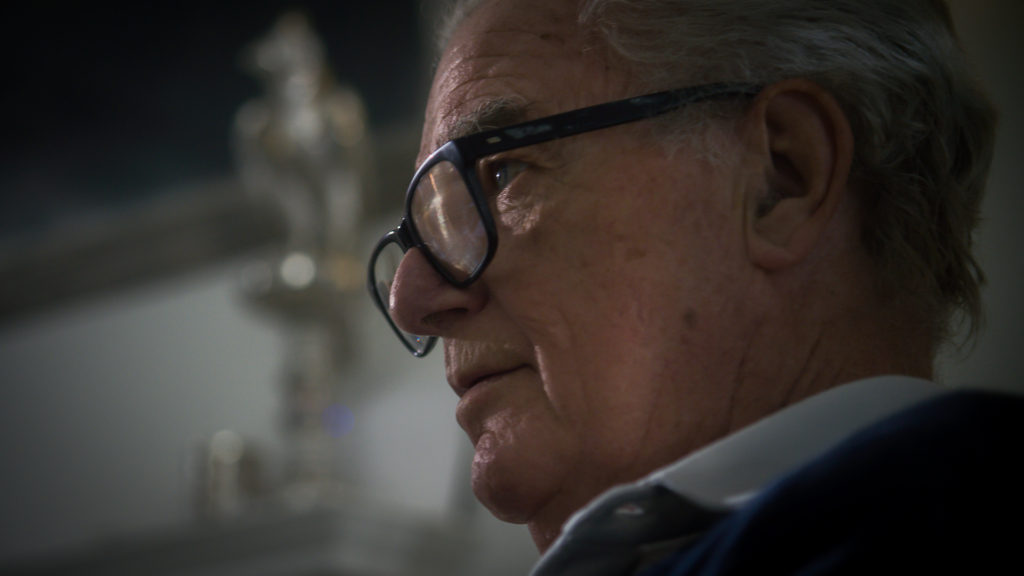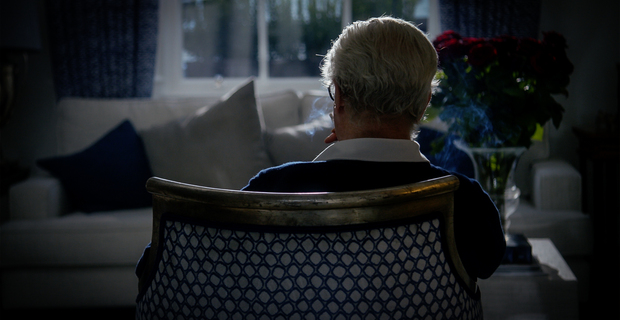Influence (2020)

One thing is sure: our post-truth world might seem to have appeared out of thin air, but the creation of it was a process that took some time. The question that remains unanswered even after watching the masterfully tense and informative documentary Influence, written and directed by Diana Neille and Richard Poplak, is whether the creators of it were conscious of what they were doing while actually doing it. And Lord Tim Bell, alongside with his PR company Bell Pottinger, who is the principal subject of the documentary is certainly a person that stood in the very centre of it.
Influence premiered at Sundance earlier this year, before starting its (online) tour of the documentary festivals, including HotDocs and Sheffield Doc/Fest, where we saw it. The thing is that the version that played at Sheffield was trimmed to 90 minutes instead of its original 105-minute runtime and there is a possibility that something got lost in the process. Nevertheless, it packs a lot of punch even in its new format, which will make it a delicious watch for some audiences, especially those interested in the political machinations in the late XX / early XXI century, while the sheer amount of information might prove a tough nut to crack for others.
What starts as a portrait documentary of an important political advertising figure too interested in money and glory to remain in shadows, quickly becomes an exposé of the rise of the dangerous PR and the political consulting industry, and towards the end it morphs into a political thriller of sorts. The filmmaking duo provides the necessary space for Bell to speak for himself (the shooting was finished before his death in 2019), but the “star” of the documentary never gets near to take over the whole project. The other interlocutors speak freely about the dirty business done by Bell Pottinger or provide an additional context of the ripples caused by the evolution of the political PR business, which is the case with Nigel Oakes, the founder of SCL Group, the holding company for the infamous Cambridge Analytica.
Bell started his career in advertising in the times when it was a relatively conservative and dull business powered by arts. The company he worked for, Sacchi & Sacchi, was the first to do daring and provoking things in sense of commercial advertising and the first to get into the political arena in the late 70’s by doing the campaign for Margaret Thatcher and her Conservative Party. The success of that campaign, especially in terms of winning over the tabloids, has created a new trend in political advertising and served as the career break for Bell who specialized himself in political marketing.

The list of Lord Tim Bell’s clients and jobs he did later on as a “geopolitical fixer” is long and shocking: the campaign for Pinochet’s successor as the president of Chile, South African National Party’s (lead by F.W. De Klerk) campaign in the first free, post-apartheid elections, the campaigns for and on the behalf of the Russian oligarchs based in London aimed against Putin’s influence (that also includes the work for the Belarus dictator Alexander Lukashenko financed by Boris Berezovsky) and so on. The iconic photograph of the former KGB agent Alexander Litvinenko on his deathbed was also the work of Bell Pottinger, and the company was additionally involved in the efforts of “winning the hearts and minds of the Iraqi people” after the invasion, efficiently milking millions and millions of dollars from the Congress for products like TV ads and soap operas whose impact could not be possibly measured.
The “showdown” final episode of the documentary concerns Bell Pottinger’s involvement with the family of internet magnates, the Gupta brothers, who created the network of corruption in the administration of the then-president of South Africa, Jacob Zuma. The company’s role in initiating the race riots with the Gupta-backed narrative of the “white monopoly capital” proved to lead to demise for all of the involved: the Guptas, Zuma, the company and Bell himself.
Neille and Poplak’s plot deftly jumps between the different locations and timelines, creating the feeling of a nauseating roller coaster ride through the reality of the post-truth world, where a created narrative directs the reality and not the other way around. For sure, some of the episodes were barely touched and that leaves the passing sensation of a dash of sensationalism, but, frankly, exposing everything Bell and his company were involved in detail demands a format that exceeds that of a documentary feature.
The filmmakers’ approach is quite simplistic, as they rely on interviews with a large number of people from different sides of the stories, an occasional situation shot and archive material edited into the film’s fabric, often with the sense of irony. Ryan Mullins’ editing is superb, as are the graphics by Brandt Botes and Christian Vetner, resulting that Influence never feels tiresome despite the huge load of information, insights and narratives the film deals with. The discreet score varying from strings drone to electronic pulsating and the nuanced sound design also contribute to making Influence a hypnotic viewing experience.
Original title: Influence
Year: 2020
Runtime: 90′
Countries: South Africa, Canada, France
Language: English
Directed by: Diana Neille, Richard Poplak
Written by: Dianna Neille, Richard Poplak
Cinematography by: Galuco Bermudez, Mark Ó Fearghaíl
Editing by: Ryan Mullins
Music by: Florencia Di Concilio
Sound design by: Benoît Dame, Catherine van der Donckt
Colourist: Mathieu Marano
Produced by: Neil Brandt, Bob Moore
Executive producers: Mila Aung-Thwin, Daniel Cross, Thandi Davids
Production companies: Storyscope, EyeSteelFilms, E, CBC Documentary Channel, Arte France TV
Sales: Cinetic Media
















